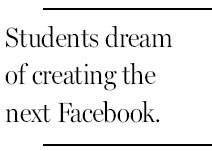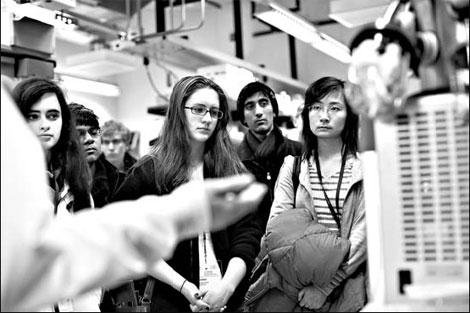Computer studies for the non-nerds
Updated: 2011-10-09 07:57
By Claire Cain Miller(The New York Times)
|
|||||||
|
Many schools are capitalizing on the growing cachet of the technology industry. High school students visiting an engineering lab at Yale University. Christopher capozziello for The New York Times |
NEW HAVEN, Connecticut - When Keila Fong arrived at Yale University here, she had never given much thought to computer science. But then last year everyone on campus started talking about the film "The Social Network," and she began to imagine herself building something and starting a business that maybe, just maybe, could become the next Facebook.
"It's become very glamorous to become the next Mark Zuckerberg, and everyone likes to think they have some great idea," said Ms. Fong, a junior.
Never mind that Mr. Zuckerberg, like other tech titans, did not major in computer science " or even finish college. Enrollment in computer science programs, and degrees from them, are rising after a decade of decreases. And educators say the inspiration is at least partly Hollywood's portrayal of the tech world, as well as celebrity entrepreneurs like Steven P. Jobs of Apple and Mr. Zuckerberg.
"It's a national call, a Sputnik moment," said Mehran Sahami, associate chairman for computer science education at Stanford University in California, referring to the Soviet satellite launching in 1957 that pushed the United States into the space race. "Students are users of Facebook or Google, and they think about how the people who created it are not that much different than themselves."
To capitalize on the growing cachet of the tech industry, American colleges, including Stanford, the University of Washington and the University of Southern California, have recently revamped their computer science curriculums to attract iPhone and Facebook-obsessed students, and to banish the perception of the computer scientist as a geek typing code in a basement.
Even universities not known for computer science or engineering, like Yale, are seizing the moment. The deans of the Ivy League engineering schools recently started meeting to create ways to market "the Ivy engineer."
The new curriculums emphasize the breadth of careers that use computer science, like finance and linguistics, and the practical results of engineering, like iPhone apps, Pixar films and robots " a world away from the more theory-oriented curriculums of the past.
"The old-fashioned way of computer science is, 'We're going to teach you a bunch of stuff that is fundamental and will be long-lasting but we won't tell you how it's applied,'" said Michael Zyda, director of the University of Southern California's GamePipe Laboratory, a new games program in the computer science major. With the rejuvenated classes, freshman enrollment in computer science at the university grew to 120 last year, from 25 in 2006.
Technology is one of the few bright spots in the American economy, with jobs growing at double the rate of job growth over all, according to federal statistics. And colleges say they do not have enough resources or professors to teach interested students.

Meanwhile, the programs woefully lag in attracting women and many minorities, though the share of computer science degrees granted to women climbed 2.5 percentage points last year to 14 percent.
At Stanford, which has never lacked computer science students, majors nearly doubled after a new curriculum in 2008 let students choose a focus, like artificial intelligence.
At the University of Washington, enrollment in the introductory computer science course is at a record high of 1,700. At Harvard University, the size of the introductory computer science class has nearly quadrupled in five years.
To hook students, Yale computer science professors are offering freshman seminars with no prerequisites, like one on computer graphics, in which students learn the technical underpinnings of a Pixar movie.
"Historically this department has been very theory-oriented, but in the last few years, we're broadening the curriculum," said Julie Dorsey, a professor.
With other students, Ms. Fong has already founded a Web start-up, the Closer Grocer, which delivers groceries to dorms at Yale.
"Once people are kind of subversively exposed to it, it's not someone telling you, 'You should program because you can be an engineer and do this in the future,'" said Ms. Fong. "It's, 'Solve this problem, build this thing and make this robot go from Point A to Point B,' and you gain the skill set associated with it."
The New York Times
(China Daily 10/09/2011 page10)
